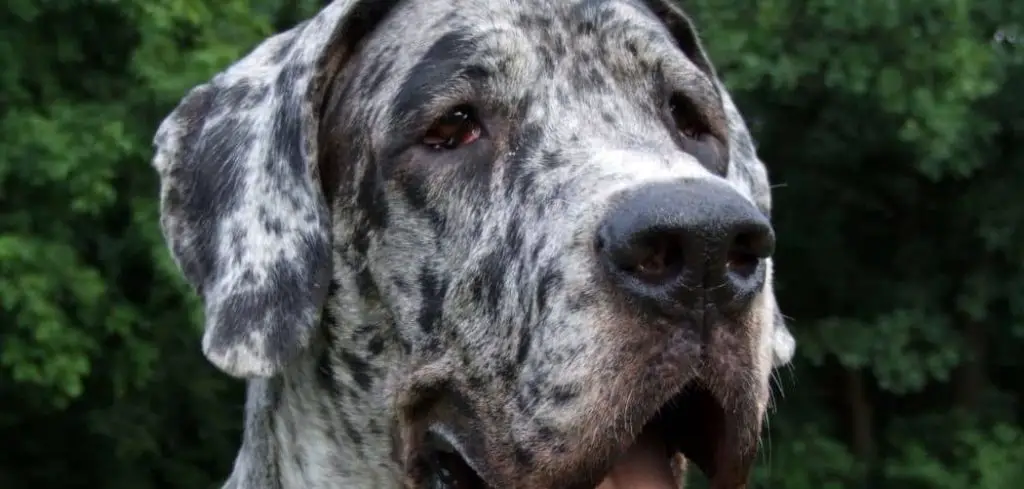If your dog is sneezing and has a runny nose, it can be worrying to see them uncomfortable or struggling to breathe normally.
These symptoms may seem harmless, but they can sometimes point to underlying health issues that need attention.
We outline the common causes of dog sneezing and a running nose, what you can do at home, and when to seek veterinary help.
Dog Sneezing and Running Nose — Why It Happens
Sneezing and nasal discharge in dogs often occur when something irritates their nasal passages or respiratory system. This could be due to allergies, infections like kennel cough, foreign objects such as grass seeds, or even more serious issues like nasal tumors.
Sometimes the discharge is watery and clear, but in other cases it may be thick, yellow, or bloody, which can signal infection or inflammation.
Dogs may sneeze occasionally without concern, but when it’s frequent and paired with a runny nose, it’s important to understand the cause.

Dog Sneezing and Running Nose: Common Causes
Allergies
Just like humans, dogs can suffer from seasonal or environmental allergies. Pollen, dust, mold, or even cleaning products can trigger sneezing and nasal discharge.
An allergic dog may also have watery eyes, itchy skin, or lick their paws excessively.
While not always dangerous, allergies can make your dog miserable and, if untreated, lead to chronic irritation.
Read more: Dog Sneezing and Coughing (What these symptoms mean for your pup)
Kennel Cough and Other Infections
Respiratory infections, such as kennel cough or canine influenza, can cause both sneezing and nasal discharge. These illnesses are contagious and often spread in environments where dogs are in close contact.
Along with a runny nose, you may notice coughing, lethargy, or a reduced appetite. Infections can range from mild to serious, and veterinary care is often needed to prevent complications.
Foreign Objects
Dogs are curious explorers and sometimes inhale small particles like grass awns, seeds, or dust that lodge inside their nasal passages.
This can lead to sudden, repetitive sneezing and a persistent runny nose, often from just one nostril. If not removed, foreign objects can cause infection or damage to the nasal tissues.
Nasal Mites
Tiny parasites known as nasal mites can infest a dog’s nasal passages, causing intense irritation. Sneezing, nasal discharge, nosebleeds, and even reverse sneezing can result.
Nasal mites are spread from dog to dog and need veterinary treatment to resolve. While not life-threatening, they can cause significant discomfort.
Dental Problems
Believe it or not, dental disease can sometimes cause sneezing and nasal discharge in dogs. When an infection from the teeth or gums spreads upward into the nasal cavity, it can irritate the sinuses.
Bad breath, pawing at the mouth, and difficulty eating may appear alongside nasal symptoms. These cases require veterinary dental care.
Nasal Tumors
Though less common, nasal tumors can lead to chronic sneezing and a runny nose, often with blood present in the discharge.
These tumors typically affect older dogs and may cause facial swelling, difficulty breathing, or noisy breathing. Early veterinary evaluation is important if symptoms persist or worsen.
What to Do If Your Dog Is Sneezing and Has A Running Nose
If your dog is sneezing with nasal discharge, start by keeping their environment clean and free of irritants like dust, smoke, or strong cleaning products. A humidifier may help soothe dry nasal passages.
Make sure your dog is drinking enough water and eating normally. Monitor the color and consistency of the discharge, as clear fluid is often less concerning than thick, yellow, or bloody mucus.
For mild allergy-related sneezing, wiping your dog’s face after walks and reducing pollen exposure may help. However, avoid giving human allergy medications without veterinary approval.
If symptoms are mild and your dog seems otherwise healthy, you can observe at home for a short period.
But if the sneezing and runny nose continue for more than a few days, or if your dog shows signs of illness, call your vet.
When to Call or Visit Your Vet
Seek veterinary care if your dog’s sneezing and runny nose are persistent, worsening, or accompanied by other concerning symptoms.
If the nasal discharge is thick, yellow, green, or bloody, this suggests infection or something more serious that needs medical attention.
Coughing, lethargy, loss of appetite, or difficulty breathing are all warning signs that your dog requires prompt veterinary evaluation.
Also, if you suspect your dog inhaled a foreign object, do not wait — veterinary removal may be necessary to prevent further harm.
Read more: Dog Sneezing and Wheezing (Here’s Why)
Key Takeaway
A dog sneezing and with a runny nose might be dealing with something as simple as allergies, or as serious as infection, parasites, or tumors.
Paying attention to the type of nasal discharge and associated symptoms can help you decide when to worry.
At home, you can reduce irritants, keep your dog hydrated, and monitor symptoms carefully. But don’t delay calling your vet if the problem persists, worsens, or is paired with other signs of illness.
Your attentiveness and quick action can make all the difference in keeping your dog comfortable and healthy.
